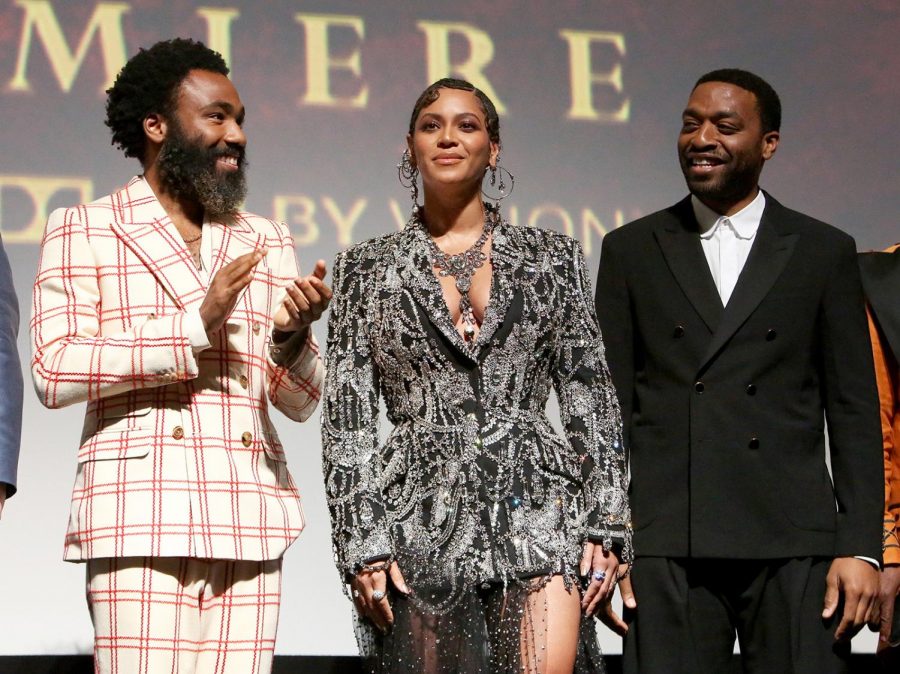REVIEW: The glory of Beyoncé’s “Black is King”
Jesse Grant Tribune News Service
Beyonce, Donald Glover, and Chiwetel Ejiofor at the World Premiere of Disney’s “The Lion King”.
Beyoncé’s “Black is King” released on July 31 exclusively on Disney, but even before the visual album premiered it provoked a whirlwind of controversy and debate.
The visual album loosely mirrors the narrative of “The Lion King” and is a cinematic adaption of “The Lion King: The Gift,” the soundtrack Beyoncé curated for the 2019 Disney remake, along with more than 20 other artists from the United States, Nigeria, South Africa, Ghana and Cameroon. At its heart, the film is a tribute to being Black, teeming with symbols, themes and cultural significance.
The visual film is a culmination of energetic, high-tempo dance sequences set to the beat of rich music, overlaid with the voices and native tongues of various artists. It is an intricate weaving of images, rhythmic dancing, flashing symbolism, laughter, poetry, darkness and light threaded together by the narration of Beyoncé herself and the sweeping music from “The Lion King: The Gift” into one swirling visual display.
Although most laud both works of art, the album and the accompanying video, for so eloquently weaving multiple voices, languages and motifs into an emotional, lavish display, Beyoncé caught the disapproval of critics for excluding Eastern African artists from both the album and the cinematic companion, where the original “Lion King” is set. Others criticized the visual film, not only for its lack of diversity but for assembling itself into an artwork intended for the Western gaze.
The release of the trailer for “Black is King” on June 28 prompted a debate on Twitter about cultural appropriation. Judicaelle Irakoze, a self-proclaimed afro-political feminist with a growing platform dedicated to human rights and social justice, described the video as art that “appropriate[s] African cultures and glorifies them under Black capitalism.”
https://twitter.com/Judicaelle_/status/1277249954034188288?s=20
For the most part, reviewers and the public alike view “Black is King” is an empowering celebration of being Black, in all its complexity and beauty.
“The album’s knowingly ethnic splendor is mesmerizing in its scope;” writes Lauren Michele Jackson for The New Yorker, “it does not attempt to provide cultural lessons, but rather, invitations to awesome delights.”
Beyoncé, the writer, director and producer of the visual album gathered multiple Black artists for its creation. One of the most noteworthy aspects of the video are the costumes that dazzle and catch the viewer’s eye in every frame. Although Beyoncé is featured wearing a myriad of prominent brands (Balmain, Valentino, Burberry), but some of her most stunning scenes feature the work of independent Black designers from around the globe. Many of the costumes are custom pieces, made from scratch.
The costumes are paired perfectly with rhythmic dances, expertly choreographed, of course, to produce a masterpiece of visual art. The marriage of movement and costume design highlight the individual importance of each person featured in the visual album. In many ways, the synthesis acts as an ode to empowerment, both female and male. It captures the beauty of various unique Black cultures and experiences and calls for their unapologetic celebration.
Beyoncé plays a mother-figure in the video to the character that mirrors Simba (who is presented as an infant, a young boy and a grown man). Her hopefulness, love and encouragement for her son fuel the video, but in a broader sense, Beyoncé has molded herself into a mother-figure delivering words of defiant empowerment to the discouraged Black community.
The result is a visual album that only includes offers a vibrant feast for the eyes and ears via the intricate artwork from various Black artists, but a moving and emotional manifesto calling for the celebration of Blackness.
“We have always been wonderful. I see us reflected in the world’s most heavenly things,” says Beyoncé, “Black Is King. We were beautiful before they knew what beauty was.”








